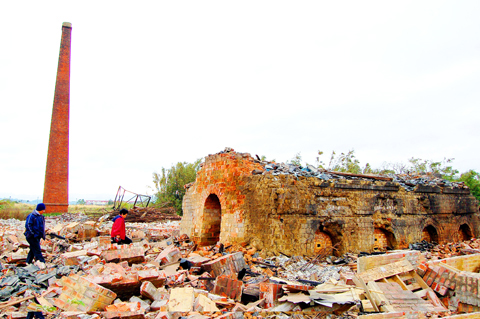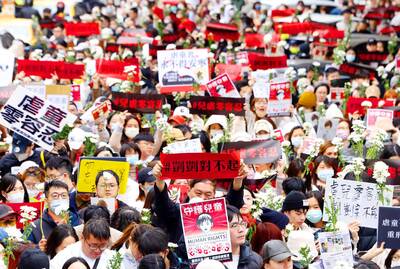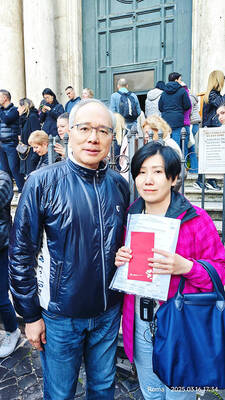After the Miaoli County Government razed three kilns that served as the last witness to the county’s once-prosperous pottery industry, preservationists set up a commemorative Web site and pledged to take action against county government officials who backed down from an agreement with the Council for Cultural Affairs (CCA) to postpone the demolition.
“This is not the time for us to mourn: We must keep fighting,” Yang Chang-chen (楊長鎮), a Miaoli native and long-time activist for local culture preservation, wrote in a message posted on the site.
Yang said he would write a petition to the Control Yuan, requesting a probe into Miaoli County Commissioner Liu Cheng-hung (劉政鴻) and potential impeachment.

PHOTO: PENG CHIEN-LI, TAIPEI TIMES
The three kilns were located in Miaoli’s Houlong Township (後龍) and were surrounded by rice fields and farms.
The area had a flourishing industry producing pottery, china, tiles and bricks during the Japanese colonial period.
As the nation’s economy developed, the old-fashioned labor-intensive kilns that once dotted the area became outdated. Eventually they were either closed, demolished or turned into factories that produce pottery with modern technology and equipment.
In 2003, however, the county government said it would build a station for the high-speed rail nearby and drew up an urban development project to turn the surrounding area into a transportation hub and high-tech industrial zone.
After the plans were drawn up, a county cultural heritage assessment commission said the three remaining old-style kilns were not of “enough historic value for preservation” and could be torn down.
Local historians and activists were upset by the decision and formed the Alliance to Rescue the Historic Kilns of Miaoli.
More than 50 civic groups across the country and nearly 600 individuals signed a petition asking the authorities to preserve the kilns.
“Miaoli can only become an attractive place for visitors if we preserve all these places with history and memory,” Den Shui-hui (鄧淑慧), founder of the alliance and owner of a traditional snake-shaped kiln in nearby Jhunan Township (竹南) told the Taipei Times via telephone.
“These kilns were hand-built and each of the bricks used was hand-made,” Den said.
“Many of the bricks actually bear some kind of mark on them and each mark has a story behind it,” Den said.
Den is also a researcher who has authored eight books on kilns in Miaoli.
The activists took their case to the CCA.
Last Tuesday, the council said it would ask the Miaoli County Government to halt the demolition and wait for the results of further negotiations with the activists.
Despite all the efforts, two of the three kilns were torn down on Thursday.
On the same day, the council released a statement expressing regret over the demolition and said it had reached an agreement with the county government to “postpone demolition until after a negotiation meeting on Jan. 14 to spare the remaining bun-shaped kiln.”
The last kiln, however, was torn down on Friday.
“We demand apologies from the CCA and County Commissioner Liu and we demand that the head of the county’s International Culture and Tourism Bureau, Lin Chen-feng [林振豐], step down. We’ll also sue him,” Den said.

Taiwan yesterday condemned the recent increase in Chinese coast guard-escorted fishing vessels operating illegally in waters around the Pratas Islands (Dongsha Islands, 東沙群島) in the South China Sea. Unusually large groupings of Chinese fishing vessels began to appear around the islands on Feb. 15, when at least six motherships and 29 smaller boats were sighted, the Coast Guard Administration (CGA) said in a news release. While CGA vessels were dispatched to expel the Chinese boats, Chinese coast guard ships trespassed into Taiwan’s restricted waters and unsuccessfully attempted to interfere, the CGA said. Due to the provocation, the CGA initiated an operation to increase

A crowd of over 200 people gathered outside the Taipei District Court as two sisters indicted for abusing a 1-year-old boy to death attended a preliminary hearing in the case yesterday afternoon. The crowd held up signs and chanted slogans calling for aggravated penalties in child abuse cases and asking for no bail and “capital punishment.” They also held white flowers in memory of the boy, nicknamed Kai Kai (剴剴), who was allegedly tortured to death by the sisters in December 2023. The boy died four months after being placed in full-time foster care with the

A Taiwanese woman on Sunday was injured by a small piece of masonry that fell from the dome of St Peter’s Basilica in the Vatican during a visit to the church. The tourist, identified as Hsu Yun-chen (許芸禎), was struck on the forehead while she and her tour group were near Michelangelo’s sculpture Pieta. Hsu was rushed to a hospital, the group’s guide to the church, Fu Jing, said yesterday. Hsu was found not to have serious injuries and was able to continue her tour as scheduled, Fu added. Mathew Lee (李世明), Taiwan’s recently retired ambassador to the Holy See, said he met

The Shanlan Express (山嵐號), or “Mountain Mist Express,” is scheduled to launch on April 19 as part of the centennial celebration of the inauguration of the Taitung Line. The tourism express train was renovated from the Taiwan Railway Corp’s EMU500 commuter trains. It has four carriages and a seating capacity of 60 passengers. Lion Travel is arranging railway tours for the express service. Several news outlets were invited to experience the pilot tour on the new express train service, which is to operate between Hualien Railway Station and Chihshang (池上) Railway Station in Taitung County. It would also be the first tourism service